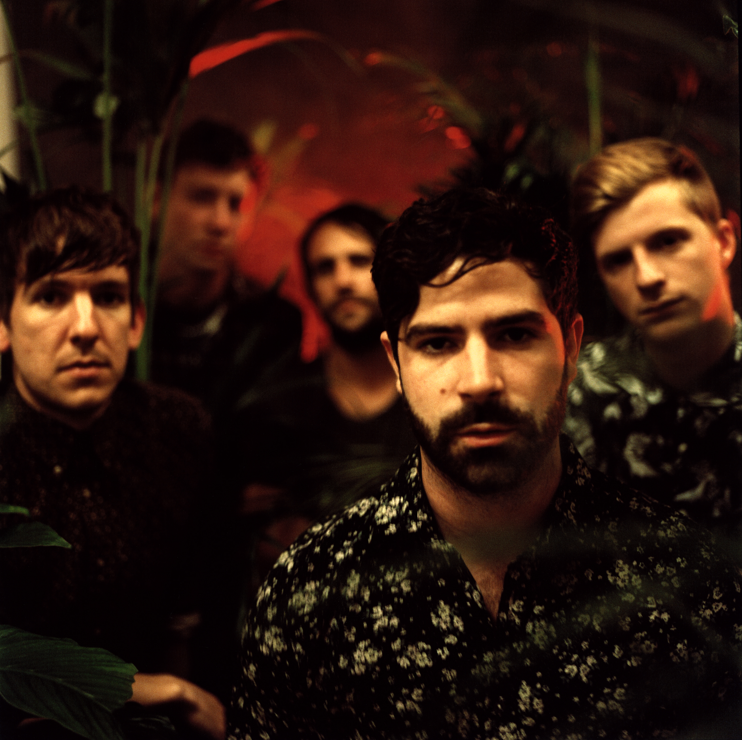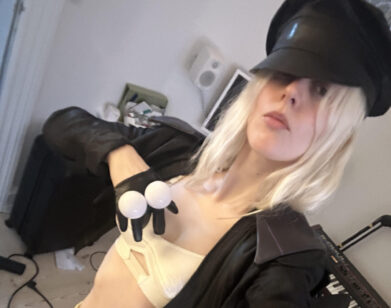Foals Are Not a Botox Band

ABOVE: FOALS. IMAGE COURTESY OF STEVE GULLICK
Yannis Philippakis forms each sentence with consideration, following from his lyric-writing mantra: “Every word has its worth.” Spoken in gruff tones with punctuating outbursts of excitement and frustration, the Foals frontman personifies the humanity that erupts from the band’s latest album, Holy Fire. Where Antidotes (2008) and Total Life Forever (2010) each furthered the quintet’s sound as a growing entity, Holy Fire is Foals unleashed, taking ownership of their musical maturity and relishing the freedom inherent in imperfection.
Following the steady build of opener “Prelude,” “Inhaler” kicks off with a visceral sense of release. It’s a massive sound, beefy and untamed, reeling with the excitement of a band achieving full control of its identity. The album was produced by legendary rock duo Flood (New Order, U2) and Alan Moulder (Depeche Mode, The Smashing Pumpkins), who worked with the band to craft a soundscape that could just as easily pound a stadium as chill spines in an intimate club.
Philippakis’ dark growl (a new development) is thrown into relief by the melancholy “Stepson” and the yearning vocal climax of “Late Night,” while the lyrics speak with a directness he says was painful to master. On the cusp of what is sure to be their biggest year yet, Philippakis shared insight into a memorable coming of age.
TEMPE NAKISKA: Hi, Yannis, how are you?
YANNIS PHILIPPAKIS: Well, I’m meant to be in Berlin with the rest of the band, but I’ve lost my passport. I got to the airport and realized I didn’t have it, so I rescheduled the flight and went back home but it wasn’t there. So I’m in a world of shit right now.
NAKISKA: Oh, man.
PHILIPPAKIS: [laughs] Yeah. We’ll work it out. Soon, I hope.
NAKISKA: Yeah, good luck. Well, let’s try to distract ourselves with the album! It takes such a different route from your previous sound. How conscious is that as part of the writing process?
PHILIPPAKIS: It’s pretty organic. There’s a conscious desire not to keep mining the same area. By the time you finish touring the record, everything that’s exciting to us is what’s ahead of us. We want to write the next paragraph.
NAKISKA: What impact does musical context have on your writing? Does what’s popular at the time have any impact on how far you push your sound?
PHILIPPAKIS: It doesn’t really have that design behind it; we’re just restless and get bored of ourselves easily. We expect a certain thing in a certain manner; we just want to do something different. It’s our lifeblood, our eternal compass making us go in that new direction, whatever it might be. We don’t relate it to what’s going on outside, it’s internal.
NAKISKA: Tracks like “Inhaler” are so much darker; it sounds like a release …
PHILIPPAKIS: It was a kind of release, yeah. It feels nice to turn off the bullshit; finally we got to do it for this record. There’s a cathartic power to screaming, and it felt good at a gut level. That’s the kind of song that we wouldn’t have written a few years ago—we wouldn’t have felt that we could, in some way. I think that’s one of the main changes we’ve experienced, slowly feeling more confident and feeling like we can kind of do whatever we want and it will always sound quite nice. It doesn’t matter what the songs are dressed up in, if it works for us we will go with it. That song actually almost didn’t make it on the record. It went through quite a strange germination process.
NAKISKA: In what way?
PHILIPPAKIS: It was this like 27-minute-long jam that was really unwieldy, and we couldn’t find a way to focus it. We left it on the back burner and worked on a lot of the other tracks on the record. Something just happened when we went back to it that afternoon; the final take is the one where it kind of clicked and we went, “Okay, so this is how it can work as a song.”
NAKISKA: I feel like the lyrics speak to the listener much more simply, more directly than your previous writing has done.
PHILIPPAKIS: If you can express something in the simplest way possible, I think there’s something noble in that. It’s easy to flesh stuff out and get all purple with it, being cryptic and wearing masks… I think it’s a bit adolescent. I wanted to write in a way that was vulnerable. I wanted to have courage in stripping back the opaque stuff so it was just raw. I like lyrics that are a lifeline, that have a purpose to them and are not just meandering around in a masturbatory way. They cut the page.
NAKISKA: How hard was that to achieve?
PHILIPPAKIS: It wasn’t easy at all. If I felt comfortable with the lyrics, then I wanted to take them in a direction I wasn’t comfortable with. It definitely wasn’t a natural thing. I almost wanted to squirm when I heard some of the lyrics back, and I wanted to feel exposed or uncomfortable listening to them in front of people I care about.
NAKISKA: Let’s talk about production. You worked with Flood and Alan Moulder; I would think that the huge scope of the album’s sound had a bit to do with their influence?
PHILIPPAKIS: Yeah definitely. I mean, Alan’s one of the best rock engineers ever, and Flood’s amazing in so many aspects of recording. We trusted that they would help us make something big, something that would sound hefty and that would grab your attention. But actually, in comparison to others we have worked with, they tinkered far less with the songs. They would let us have the things we were territorial over and would give us the space to work with them.
NAKISKA: Even though it’s an epic sound, it feels quite stripped back, organic…
PHILIPPAKIS: A record like Antidotes sounds more polished than this one, I think. Mainly, the takes we ended up using are the ones we labored over less; the majority of the album you hear is actually from the earliest stages of recording. We thought we were just referencing and doing demos. It was more flowing and flippant than consciously doing a take. It had a natural feeling to it, and we didn’t let ourselves edit everything and beat-match everything.
NAKISKA: It’s like you’ve left a lot of character in the sound. Does that preference for a more natural style of production extend to what you listen to?
PHILIPPAKIS: Definitely. I’m appalled by the tendency of some rock records to perfect everything to the point where it sounds like Botox and polish it so heavily that there’s no humanity left in it. By that stage, it has just been placed in a computer grid.
NAKISKA: I heard some of the first writing for the album was done outdoors?
PHILIPPAKIS: That was when we were in Australia. There were certain tracks that sounded good in nature and just harmonized to that environment. We were working with Jagwar Ma, and they were playing us all this Primal Scream and all this daggy stuff we wouldn’t listen to in Britain. They had this different perspective on it. We felt like there was something fun in swampier grooves and keeping in mind that music should be able to exist outside an urban space.
NAKISKA: How did that impact on you recording back in London, in the city?
PHILIPPAKIS: We brought in a lot of vegetation into the studio and sampled heaps of insects; we sampled bees, and we sampled flies. There are those organic samples throughout the record, like in “Prelude” and “Black Milk and Spiders”… and “Stepson,” heaps actually. We wanted to bring in the musicality of the insect world. It was fun.
NAKISKA: That’s brilliant. So what are you doing once you get your passport?
PHILIPPAKIS: [laughs] If I get it! After the promo stuff we start touring; UK, Europe, South America, North America, then maybe Australia in the autumn. It’s going to be a good year.
NAKISKA: What are you excited about for this tour?
PHILIPPAKIS: We’ve been playing a bit of the album live already, but it will be nice to play more tracks. Jimmy’s on a Rhodes keyboard for a lot of it which will bring a really great dynamic to us on stage. Mainly, though? Having three records under our belt; it’s nice to have the freedom to draw from three records.
HOLY FIRE IS OUT TODAY. FOR MORE ON FOALS, VISIT THEIR WEBSITE.






